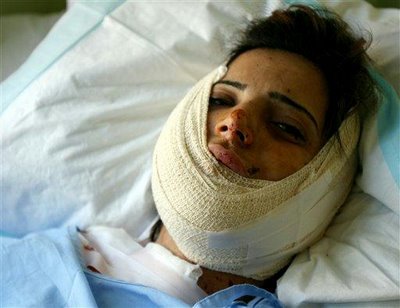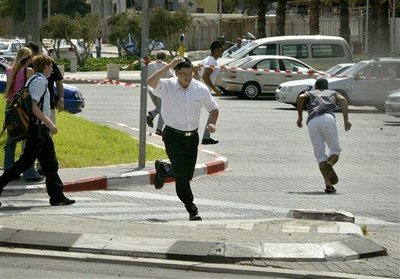War is peace.

 Lebanese woman lies injured in hospital after a missile attack on her car; Israeli citizens in Haifa run as sirens warn of a rocket attack.
Lebanese woman lies injured in hospital after a missile attack on her car; Israeli citizens in Haifa run as sirens warn of a rocket attack.No one honestly expected that the passing of a UN resolution calling for a "full cessation of hostilities" would instantly end the Israel-Lebanese conflict, having now raged for over a month. Even the most cynical though thought it unlikely that Israel would have the audacity not only to almost entirely ignore its passing, but continue in the collective punishment of the entire Lebanese nation. On Friday the Israelis destroyed one of the last remaining bridges to Syria, this time in the far north of the country. They also bombed "power facilities" in the port town of Sidon, which had so far emerged relatively unscathed. A convoy of refugees, escorted by UN peacekeepers was also hit, killing at least 4 people, with other sources saying 7. The Israelis had been informed, and had agreed to its passing, yet it was still attacked. An Israeli spokesman said that the raid had been a "mistake", which obviously makes everything a-ok.
While Olmert has stated that he will put the UN resolution plan for a ceasefire to his cabinet on Sunday and argue for it be accepted, whether even that will bring a quick end to the fighting is in question. The ordering of the major ground offensive, with the emphasis appearing to be on getting to the Litani river as quickly as possible, suggests that Israel has no intention of leaving the south of Lebanon until at the very least the Lebanese army deploys its 15,000 troops, as stipulated in Resolution 1701. That the Litani river continues to play such a major part in the conflict reflects one of the other issues affecting Israel: the arid nature of the region, and the drying up of the remaining resources of water available to the country. The strategic benefits of controlling the river are both obvious and may become increasingly important, as the shortage of water looks likely only to get worse.
For their part, Hizbullah's leader Nasrallah has already said that the militia will abide by the ceasefire, once that all the Israeli troops have left Lebanese territory. Seeing as that doesn't seem to be something that'll happen quickly, the horrible spectre of yet more atrocities being committed on both sides remains.
While some apologists for Hizbullah have been pointing out how their rockets are being launched at legitimate targets, such as army bases within Israel, the very nature of the katyusha rockets, being both old and very inaccurate, as well as filled with ball bearings, means that innocent civilians are always going to be hit. That their missiles have also been just as likely to kill Arab Israelis, with some also landing and killing Palestinians in the West Bank, shows how futile and counter-productive the majority of the Hizbullah attacks on Israel itself have been.
Not that this in any way mitigates for the crimes which have been visited on Lebanon from the air. The Guardian reports on how at least 61 Lebanese were killed on Monday in a strike on the Shiyyah district of southern Beirut. That's 20 more than the entire number of Israeli civilians killed, and far outstrips the massacre in Qana as one of the worst, if not the worst, Israeli atrocity of the war. The destruction of numerous power plants, in one case leading to an environmental disaster which threatens to be as devastating to the Lebanese coastline as the Exxon-Valdez spillage was in Alaska, shows in its true light just what Israeli "self-defense" means. 1,020 civilians are dead. Thousands of homes have been destroyed. And for what?
If anything, the resolution leaves Hizbullah stronger than ever before. Even if now rightly forced to disarm, it's likely to become an even bigger force in politics in Lebanon, with the recognition from around the Arab world that it held off and struck a blow against Israel. In Israel, the opposite is the case. The bombardment of Lebanon will leave it with even fewer friends around the globe, sickened by the disproportionate nature of its response to an attack which was unjustifiable, but clearly aimed at showing solidarity with the Palestinian fighting which continues in the Gaza strip. If anything is to be learned from the disaster, it's that the military option no longer works. It should re-energise the Israeli left into realising that the unilateral settlement proposed by Olmert is dead in the water. Their supposed pacifist hero, Amir Peretz, has been just as bloodthirsty as his predecessors. The way forward is for a negotiated peace, involving both Hamas and Abu Mazen. Both Israel and the Palestinians (especially Hamas) will have to make sacrficies, but both must now accept that persistent conflict only leaves a legacy of hatred and grievance that cannot be easily diminished, forgiven, or forgotten.
Post a Comment